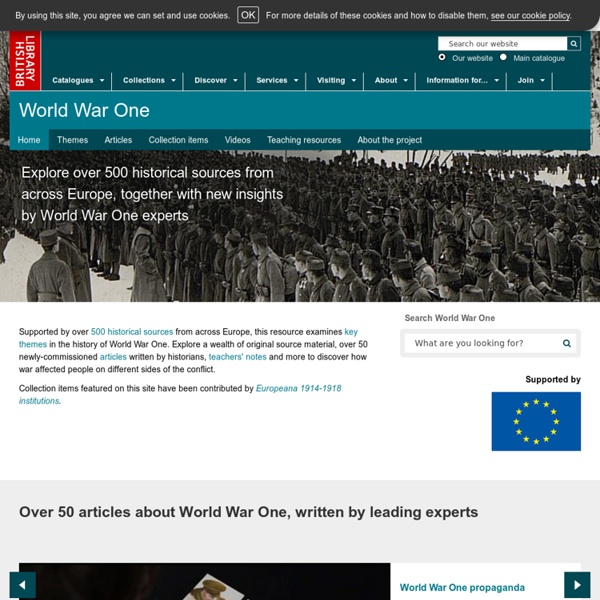



http://www.bl.uk/world-war-one
Related: World War One • World 20th centuryAustralian War Memorial Anzac Diversity Collection Anzac Diversity is a collection of case studies exploring the ethnic diversity of the Australian Imperial Force (AIF). Anzac Diversity Anzac Diversity is a collection of case studies exploring the ethnic diversity of the Australian Imperial Force (AIF). The debate on the origins of World War One - The British Library Beginning with the assassination of Archduke Franz Ferdinand, Dr Annika Mombauer explores the opposing debates about the origins of World War One. Is it possible for historians to arrive at a consensus? The hundred-year debate How could the death of one man, Archduke Franz Ferdinand, who was assassinated on 28 June 1914, lead to the deaths of millions in a war of unprecedented scale and ferocity?
Over Here: WWI and the Fight for the American Mind World War I. The Great War. The War to End All Wars. The conflict that enveloped the globe from July 28, 1914, to November 11, 1918, backlit an intense home-front struggle as Americans debated their individual and collective relationship to the conflict. Should the United States be involved in the war? If so, then to what extent and in what capacity? Hong Kong transfer: Handover ceremony in 1997 CCTV News The celebrations are still continuing as the victorious coach, Joachim Loew, has been honored for his achievement in his hometown of Freiburg.Germany coach Loew honored in hometown of Freiburg Chinese men´s national team continued its preparations for next year´s Asian Cup, as they managed a one-all draw against visitors Jordan during a football friendly in Harbin, the capital city of Northeast China´s Heilongjiang Province.China held to 1-1 draw by Jordan The defending world champs came into the contest with a perfect 6-and-oh record, but they would be in for a tough first half before opening things up in the second.USA beat Slovenia 119-76 in quarter-finals
First War War Poetry The First World War Poetry Digital Archive is an online repository of over 7000 items of text, images, audio, and video for teaching, learning, and research. The heart of the archive consists of collections of highly valued primary material from major poets of the period, including Wilfred Owen, Isaac Rosenberg, Robert Graves, Vera Brittain, and Edward Thomas. This is supplemented by a comprehensive range of multimedia artefacts from the Imperial War Museum, a separate archive of over 6,500 items contributed by the general public, and a set of specially developed educational resources. These educational resources include an exciting new exhibition in the three-dimensional virtual world Second Life. Freely available to the public as well as the educational community, the First World War Poetry Digital Archive is a significant resource for studying the First World War and the literature it inspired.
How did soldiers cope with war? - The British Library Curator Dr Matthew Shaw, explores notions of patriotism, social cohesion, routine and propaganda, to ask how soldiers of World War One were able to psychologically cope with the realities of combat. Introduction Given our understanding of the horrors of war, it is often difficult to understand how men coped with life at the Front during the First World War. Many, of course, did not: it is during this period that shell shock and what we now know as post-traumatic stress disorder were first described and diagnosed . Hundreds, across all the armies involved in the war, deserted, and both sides faced large mutinies – among the French in 1917 and by the German navy in 1918, as well the Russian Revolution in 1917. But these aside, the majority of those serving followed orders and often acted with enormous courage and bravery, as well as killing their fellow men.
Encyclopedia Britannica Alternate titles: First World War; Great War; WWI World War I, also called First World War or Great War, an international conflict that in 1914–18 embroiled most of the nations of Europe along with Russia, the United States, the Middle East, and other regions. The war pitted the Central Powers—mainly Germany, Austria-Hungary, and Turkey—against the Allies—mainly France, Great Britain, Russia, Italy, Japan, and, from 1917, the United States. It ended with the defeat of the Central Powers. Digital Collection - NZ You are here: Home > Digital Collection > Wars & conflict Heritage Digital Collection Home The Canterbury Aviation (N.Z.) Co.: the first hundred pilots World War One: 10 interpretations of who started WW1 Image copyright Alamy As nations gear up to mark 100 years since the start of World War One, academic argument still rages over which country was to blame for the conflict. Education Secretary for England Michael Gove's recent criticism of how the causes and consequences of the war are taught in schools has only stoked the debate further. Here 10 leading historians give their opinion.
World War I in Photos: Introduction A century ago, an assassin, a Serbian nationalist, killed the heir to the throne of Austria-Hungary as he visited Sarajevo. This act was the catalyst for a massive conflict that lasted four years. More than 65 million soldiers were mobilized by more than 30 nations, with battles taking place around the world. Industrialization brought modern weapons, machinery, and tactics to warfare, vastly increasing the killing power of armies. Battlefield conditions were horrific, typified by the chaotic, cratered hellscape of the Western Front, where soldiers in muddy trenches faced bullets, bombs, gas, bayonet charges, and more. On this 100-year anniversary, I've gathered photographs of the Great War from dozens of collections, some digitized for the first time, to try to tell the story of the conflict, those caught up in it, and how much it affected the world.
WW100 New Zealand A selection of sites and sources for learning about the history of the First World War from a New Zealand perspective, and the role your family members might have played in it. Soldiers inside the YMCA library in Beauvois, France. Ref: 1/2-013635-G. Courtesy of Alexander Turnbull Library, Wellington, New Zealand. Starting Places